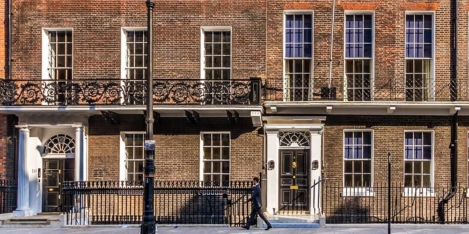To provide the best experiences, we use technologies like cookies to store and/or access device information. Consenting to these technologies will allow us to process data such as browsing behaviour or unique IDs on this site. Not consenting or withdrawing consent, may adversely affect certain features and functions.
The technical storage or access is strictly necessary for the legitimate purpose of enabling the use of a specific service explicitly requested by the subscriber or user, or for the sole purpose of carrying out the transmission of a communication over an electronic communications network.
The technical storage or access is necessary for the legitimate purpose of storing preferences that are not requested by the subscriber or user.
The technical storage or access that is used exclusively for statistical purposes.
The technical storage or access that is used exclusively for anonymous statistical purposes. Without a subpoena, voluntary compliance on the part of your Internet Service Provider, or additional records from a third party, information stored or retrieved for this purpose alone cannot usually be used to identify you.
The technical storage or access is required to create user profiles to send advertising, or to track the user on a website or across several websites for similar marketing purposes.
 A new quarterly report that claims to analyse the latest trends taking place in cities across the UK has been published by Future Cities Catapult, the Government-backed centre of expertise in urban innovation, the City Innovation Brief (automatic download) summarises key developments and changes from cities across the UK, identifying where money is being invested and what future opportunities might look like within the advanced urban services sector.
A new quarterly report that claims to analyse the latest trends taking place in cities across the UK has been published by Future Cities Catapult, the Government-backed centre of expertise in urban innovation, the City Innovation Brief (automatic download) summarises key developments and changes from cities across the UK, identifying where money is being invested and what future opportunities might look like within the advanced urban services sector.









 There are ongoing dual narratives in UK economy caused by the 2016 Brexit vote, the latest Morgan McKinley October Employment Monitor suggests. On the one hand, a new report by Colliers International dubbed London Europe’s top economic City. On the other hand, institutions are stubbornly stuck in limbo, and the fear of major jobs losses looms thick in the sky, keeping hiring low. “The economic tug of war that Brexit kicked off means we still have no idea quite where we’ll land,” said Hakan Enver, Operations Director, Morgan McKinley Financial Services. October was the lowest jobs month of 2017, a possible indication that the closing months of the year will be especially quiet. Job seekers increased by 6 percent month-on-month, but were down just under 40 percent year-on-year. The trajectories are in line with the overall dual trends of 2017. Jobs available were down 14 percent month-on-month and 20 percent year-on-year. Given the underlying health of the economy, Brexit looks to be the main culprit for the job market attrition.
There are ongoing dual narratives in UK economy caused by the 2016 Brexit vote, the latest Morgan McKinley October Employment Monitor suggests. On the one hand, a new report by Colliers International dubbed London Europe’s top economic City. On the other hand, institutions are stubbornly stuck in limbo, and the fear of major jobs losses looms thick in the sky, keeping hiring low. “The economic tug of war that Brexit kicked off means we still have no idea quite where we’ll land,” said Hakan Enver, Operations Director, Morgan McKinley Financial Services. October was the lowest jobs month of 2017, a possible indication that the closing months of the year will be especially quiet. Job seekers increased by 6 percent month-on-month, but were down just under 40 percent year-on-year. The trajectories are in line with the overall dual trends of 2017. Jobs available were down 14 percent month-on-month and 20 percent year-on-year. Given the underlying health of the economy, Brexit looks to be the main culprit for the job market attrition.
 Office rents have begun to slip across Central London, and the chief reasons could be uncertainty around the outcome of the Brexit talks and the UK seemingly missing out on the rising level of global trade, suggests Cluttons’ London Office Market Bulletin Autumn 2017. While the report highlights that many locations in Central London have seen headline office rents hold steady for the better part of two years, rent free periods have been moving out in order to sustain this, but now appear to be at a critical tipping point, level, which is driving some landlords to consider alternative incentives, such as delayed completions. Freddie Pritchard-Smith, Head of commercial office agency at Cluttons said: “Many firms remain nervous about making a long-term commitment to more space, choosing either flexible overflow space or to reconfigure within their existing office. The exception to this of course remains the serviced office and TMT sectors, who have helped transactional levels in the West End to surpass 4 million sq ft already this year, which is paradoxical to the falling rental conditions.”
Office rents have begun to slip across Central London, and the chief reasons could be uncertainty around the outcome of the Brexit talks and the UK seemingly missing out on the rising level of global trade, suggests Cluttons’ London Office Market Bulletin Autumn 2017. While the report highlights that many locations in Central London have seen headline office rents hold steady for the better part of two years, rent free periods have been moving out in order to sustain this, but now appear to be at a critical tipping point, level, which is driving some landlords to consider alternative incentives, such as delayed completions. Freddie Pritchard-Smith, Head of commercial office agency at Cluttons said: “Many firms remain nervous about making a long-term commitment to more space, choosing either flexible overflow space or to reconfigure within their existing office. The exception to this of course remains the serviced office and TMT sectors, who have helped transactional levels in the West End to surpass 4 million sq ft already this year, which is paradoxical to the falling rental conditions.”
 Despite recent figures indicating that work productivity is down in Britain, the UK remains a highly attractive country for employers and employees based on a combination of talent, location, quality of life and cost, according to the latest edition of Colliers International’s European Cities of Influence report. The analysis of 50 major European economic cities for employers saw London retain its top position, with all other UK cities in the analysis featuring in the top 20 (Birmingham, Edinburgh, Manchester, Bristol and Glasgow).The report finds that quality of life factors are important to accelerate business and attract talent with the research revealing that the nature of workplace strategy is evolving so rapidly that keeping up — let alone staying ahead of the curve — can be a challenge. Employers are now focused on creating a workplace that can attract and retain talent by incorporating co-working and collaborative facilities, flexible working options and ingraining a healthy mindset. With the onus on keeping employees happy and productive, the design and utilization of the workplace is helping to accelerate business productivity more than ever before.
Despite recent figures indicating that work productivity is down in Britain, the UK remains a highly attractive country for employers and employees based on a combination of talent, location, quality of life and cost, according to the latest edition of Colliers International’s European Cities of Influence report. The analysis of 50 major European economic cities for employers saw London retain its top position, with all other UK cities in the analysis featuring in the top 20 (Birmingham, Edinburgh, Manchester, Bristol and Glasgow).The report finds that quality of life factors are important to accelerate business and attract talent with the research revealing that the nature of workplace strategy is evolving so rapidly that keeping up — let alone staying ahead of the curve — can be a challenge. Employers are now focused on creating a workplace that can attract and retain talent by incorporating co-working and collaborative facilities, flexible working options and ingraining a healthy mindset. With the onus on keeping employees happy and productive, the design and utilization of the workplace is helping to accelerate business productivity more than ever before.
 The London office market remains a buoyant market despite Brexit uncertainty, as many organisations see it as the most prestigious location for businesses of any size. In
The London office market remains a buoyant market despite Brexit uncertainty, as many organisations see it as the most prestigious location for businesses of any size. In 
 Businesses are concerned about the pace of commitment to improving the UK’s infrastructure, and a record number of firms are dissatisfied with the state of infrastructure in their region. With the UK currently ranking 27th in the world for the quality of its infrastructure, nearly all (96 percent) of businesses in the 2017 CBI/AECOM Infrastructure Survey see infrastructure as important (of which 55 percent view it as critical) to the Government’s agenda. From the Clean Growth Strategy and the £500 billion infrastructure pipeline to its decision to build a new runway at Heathrow and press ahead with the A303 tunnel, the Government has made clear its commitment to British infrastructure. However, only one in five firms is satisfied with the pace of delivery (20 percent) and almost three quarters (74 percent) doubt infrastructure will improve over this Parliament. This lack of confidence is attributed primarily to policy inconsistency (+94 percent of firms) & political risk (+86 percent). The digital sector is the exception, however, where 59 percent of firms are confident of improvements.
Businesses are concerned about the pace of commitment to improving the UK’s infrastructure, and a record number of firms are dissatisfied with the state of infrastructure in their region. With the UK currently ranking 27th in the world for the quality of its infrastructure, nearly all (96 percent) of businesses in the 2017 CBI/AECOM Infrastructure Survey see infrastructure as important (of which 55 percent view it as critical) to the Government’s agenda. From the Clean Growth Strategy and the £500 billion infrastructure pipeline to its decision to build a new runway at Heathrow and press ahead with the A303 tunnel, the Government has made clear its commitment to British infrastructure. However, only one in five firms is satisfied with the pace of delivery (20 percent) and almost three quarters (74 percent) doubt infrastructure will improve over this Parliament. This lack of confidence is attributed primarily to policy inconsistency (+94 percent of firms) & political risk (+86 percent). The digital sector is the exception, however, where 59 percent of firms are confident of improvements.




 Strong demand and a lack of supply is helping to boast the regional office rental market, according to Savills’ latest Regional Offices Market Watch. The firm anticipates that take-up will reach 9.8 million sq ft (910,450 sq m) by the end of 2017, a 4 percent increase on 2016 and 9 percent up on the 10 year average. This is due to a number of large Government Property Unit (GPU) deals completing in the second half of the year. As a result of strong demand, total availability across the UK fell by 1 percent to 30 million sq ft (2.787 million sq m) in the first half of the year, which equates to just 1.8 years worth of available Grade A supply. What’s more, Savills notes that office based employment across the regional cities is forecast to grow by up to 4.6 percent over the next five years, leading to a net additional 55,000 jobs, representing a need for a further 5 million sq ft (464,616 sq m) of office space.
Strong demand and a lack of supply is helping to boast the regional office rental market, according to Savills’ latest Regional Offices Market Watch. The firm anticipates that take-up will reach 9.8 million sq ft (910,450 sq m) by the end of 2017, a 4 percent increase on 2016 and 9 percent up on the 10 year average. This is due to a number of large Government Property Unit (GPU) deals completing in the second half of the year. As a result of strong demand, total availability across the UK fell by 1 percent to 30 million sq ft (2.787 million sq m) in the first half of the year, which equates to just 1.8 years worth of available Grade A supply. What’s more, Savills notes that office based employment across the regional cities is forecast to grow by up to 4.6 percent over the next five years, leading to a net additional 55,000 jobs, representing a need for a further 5 million sq ft (464,616 sq m) of office space.



















